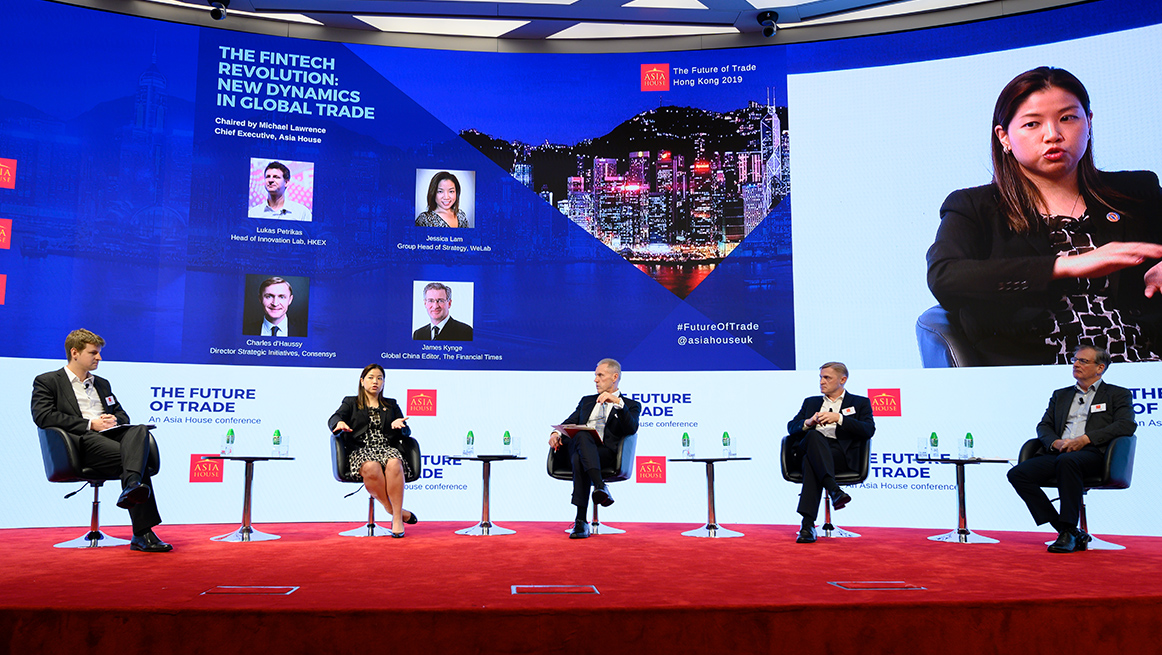Driving commercial and political engagement between Asia, the Middle East and Europe
Driving commercial and political engagement between Asia, the Middle East and Europe
Driving commercial and political engagement between Asia, the Middle East and Europe

The FinTech revolution is causing widespread disruption across Asia’s business landscape, with fierce competition among cities in the region to attract talent and investment. The Asia House Future of Trade conference, held at HKEX in Hong Kong, brought key industry figures together to explore the impact of this revolution, including the technologies in play, the challenges that come with them, and how regional players, including Hong Kong, are attempting to stay ahead of the FinTech curve.
Michael Lawrence, Chief Executive of Asia House, noted the “phenomenal pace” of innovation in Asia and the strong regional competition Hong Kong faces in the FinTech space. How can Hong Kong establish itself as a leader?
For Jessica Lam, Group Head of Strategy at WeLab, Hong Kong was where they started their operations in 2013 – at a time when startups and FinTech enjoyed a fraction of the profile they do today. Although WeLab has now expanded internationally, Lam noted that Hong Kong is more than just a launchpad for them. They are building a virtual bank there, which Lam says could eclipse all their other businesses internationally.
“You can see Hong Kong as a launchpad, but you can also see it as being the most solid foundation and, on a standalone basis, being an extremely ripe and lucrative market to start a business,” she said.
Charles d’Haussy, Director Strategic Initiatives for Consensys, agreed. He added that a key advantage that Hong Kong’s FinTech ecosystem has is that it’s growing organically, without too much interference in the form of subsidies.
“Government, regulators and key stakeholders are supporting the ecosystem,” he said. “Subsidies and support are available, but they do not get too involved. And Hong Kong has very strong B2B financial services.”
However, James Kynge, Global China Editor for the Financial Times, offered a different perspective, noting that Hong Kong was “lagging behind” when it comes to being a FinTech centre. He pointed to India, referring to it as the “hottest tech story in the region at the moment” due to the rapidly increasing number of unicorns.
“India is a feeding frenzy for FinTech companies – not just local companies, but lots of international players as well,” he said. “FinTech is at the centre of India’s emergence.”
Kynge also highlighted mainland China, where digital payments are dwarfing that of the United States and where the People’s Bank of China is about to launch a digital currency.
“China is already digital. There is absolutely no psychological barrier to this at all, so in a way the ground has already been set.”
Citing a recent McKinsey report, Kynge also said that established banks risk becoming a “footnotes in history”.
“What’s happening is revolutionary and the way that it will revolutionise Hong Kong and the rest of the region will be, I think, very dramatic.”
On the issue of intergenerational attitudes to the FinTech revolution, Lam acknowledged that there will be some who take longer to embrace innovations. “The key thing is that everyone is open minded and won’t resist change, because when you are resistant to learning new things, that is when things go wrong,” she warned.
Lukas Petrikas, Head of Innovation Lab at HKEX, noted that FinTech has a huge role to play in getting the current generations more proactive and excited about how they manage their wealth and assets.
“We need to ask ourselves challenging questions, like how can we make capital markets relevant to people? We need to associate them with the physical world around them.”
Meanwhile, D’Haussy believes that the change will be more natural. In his view, technologies such as blockchain will disappear from conversations entirely in one year because it will become part of normal day-to-day life.
“Today we’re thinking in all these complicated terms, but it’s going to be totally integrated into the economy.”
For Kynge, FinTech is bringing about change that hasn’t been seen for a hundred years.
“FinTech is where it’s at at the moment,” he said.
“There is no greater disruptive force in Asian business right now than FinTech.”
WATCH the full discussion on the FinTech revolution at Asia House TV
